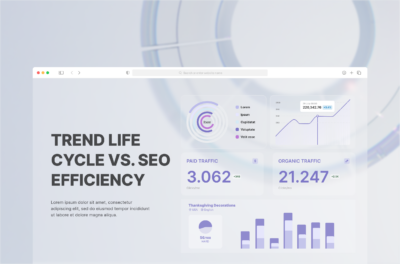Topical authority vs. keyword density: what AI search engines really value
Topical authority has replaced keyword density as the key measure of relevance. Learn how these two differ and how to optimize your content for topical authority in light of the growing impact of search AI.

Traditional SEO used to be a numbers game. Success was measured by how many times you could fit a keyword into a page. Writers counted phrases, adjusted headings, and worried about percentages. But with the rise of large language models (LLMs) and AI-driven search, the rules have changed. Now, what matters is whether your content proves you know the subject inside and out – not just how many times you use a keyword or a phrase per page. Topical authority has replaced keyword density as the key measure of relevance.
Read on to discover:
- the difference between keyword density & topical authority
- why it matters now more than ever
- how to measure topical authority
- how to optimize your content to make it AI-friendly

What is topical authority?
Topical authority is a key SEO concept referring to the level of expertise, credibility, and trustworthiness a website or author has on a specific topic or niche.
Strong topical authority means that the algorithms perceive a website as a go-to resource based on content that:
- is comprehensive, high-quality, and reliable;
- covers a broad and deep range of subtopics related to a core subject.
Unlike focusing on individual keywords, topical authority signals to search engines that the site has extensive knowledge and relevance in the field, which typically results in better rankings on Google and other search engines.
Why does topical authority matter?
- Improved search rankings: Google’s algorithms favor websites that demonstrate expert-level knowledge on specific topics. A site with strong topical authority is more likely to rank higher because it fulfills user intent in a comprehensive and authoritative way.
- Enhanced credibility and trust: By consistently delivering valuable, accurate, and in-depth content, a website builds trust with both users and search engines. This aligns with Google’s E-E-A-T framework (experience, expertise, authoritativeness, and trustworthiness), which supports higher rankings and may increase the probability of getting cited by AI (e.g. AI Overview).
Read more about E-E-A-T in the age of AI Search: building trust with generative engines
- Better user experience: When sites cover topics thoroughly and present information in a clear, structured way, users can find everything they need in one place instead of jumping between sources. This efficiency improves satisfaction and often leads to higher engagement.
- More meaningful traffic: Pages backed by strong topical authority are more likely to attract relevant visitors and build a loyal audience that values trusted information. While topical authority takes time to establish, it helps drive traffic that is more engaged and aligned with the site’s expertise.
Get free AI Search Visibility checklist
Topical authority supports visibility in AI Search. But how’s your visibility at the moment? Download the free checklist and find out!
Best practices for building topical authority:
- Select a focused topic: Choose a niche or subject area in which you have real expertise and can create authoritative content regularly.
- Perform thorough keyword and topic research: Identify a broad set of related keywords and subtopics (keyword clusters) around your main topic. This helps in creating content that covers the topic comprehensively.
- Create in-depth, high-quality content: Focus on detailed, informative, and accurate content that deeply explores every aspect of the topic. Incorporate expert insights, research, and data to enhance credibility.
- Demonstrate E-E-A-T: Showcase expertise and experience through author credentials, data-backed information, and transparency.
- Build content clusters and internal linking: Structure your content around clusters of related subtopics, linking pages internally to help Google understand the relationship between them and to strengthen your overall topical authority. Deep exploration of a topic usually requires more than one article or page – the key is to create a network of interrelated content based on a knowledge graph that is logically and semantically connected within your site.
- Regularly update and expand the content: Keep your content current and continually add new information to maintain relevance and authority.
- Gain quality backlinks: Encourage backlinks from reputable and relevant sites, which act as endorsements and further boost your site’s authority on the topic.
In simple words, topical authority matters because it signals to search engines and users that your site is a reliable, expert resource on a subject. This, in turn, leads to higher rankings, more trust, and better user engagement. Building a high level of topical authority requires a strategic commitment to quality, depth, and consistency in your content efforts.
What is keyword density?
Keyword density refers to the percentage or ratio of times a particular keyword or key phrase appears within a web page, compared to the total word count of that page. It’s a fundamental SEO metric that helps indicate to search engines what the main topic of a page is.
To calculate keyword density, you can use this formula: (number of times keyword appears/total number of words in text) x 100.

For example, if your target keyword appears 10 times in a 1,000-word article, its keyword density would be: (10/1000)×100=1%
Why does keyword density matter?
Originally, search engines used keyword density as a key factor in ranking pages. The more often a keyword appeared, the more relevant the page seemed for that term. However, this led to the phenomenon of “keyword stuffing,” where creators overloaded content with keywords in an unnatural way, reducing readability and user experience.
Currently, algorithms are more sophisticated – they analyze context, synonyms, semantic meaning, and overall content quality. While using your target keyword is still an important signal, excessive repetition can hurt rankings. Over-optimized content may be penalized as spam or seen as less valuable to users.
Read more about Intent-based search: why AI understands customers better than keywords
Best practices
- Keep density moderate: Most experts recommend 1–3% for main keywords, though there’s no strict rule – content should prioritize readability and user intent above density.
- Use natural language: Incorporate synonyms, related phrases, and variations to help search engines understand the topic without keyword stuffing.
- Check your density: You can use tools like SEOquake, Serpstat, SmallSEOTools, or WordCounter to analyze keyword frequency and density for individual pages.
In short, keyword density is a useful metric for evaluating SEO focus, but modern AI search engines value content that uses keywords naturally within a well-structured, context-rich article.
What’s the difference between topical authority & keyword density?
Topical authority refers to a website or page’s perceived expertise, comprehensiveness, and trustworthiness on a given subject.
Rather than merely repeating keywords, topical authority is demonstrated by creating extensive, well-structured content that thoroughly addresses a topic and its related subtopics. This depth and breadth of coverage help search engines and AI models understand the subject matter in context, thereby boosting the page’s credibility and visibility in search results.
In contrast, keyword density measures the frequency of specific keywords within a text relative to its overall length. Historically, this metric used to guide content creators to include relevant keywords often enough to rank well. However, with the growing impact of LLMs, the mechanical repetition of keywords – known as keyword stuffing – has lost its effectiveness and may even harm rankings.
Modern search AI prioritizes semantic understanding and the natural flow of language over keyword frequency, focusing on how meaning is conveyed rather than how often terms appear.
Key content strategies after the AI-driven shift in SEO paradigms
AI-driven search engines and LLMs have fundamentally changed how content is evaluated. Instead of relying on the old formula of keyword density, search AI now assesses content based on its topical authority – how well the content covers a subject in a deep, meaningful, and interconnected way.
This paradigm shift demands that content creators move beyond “keyword stuffing” techniques and focus on several key strategies:
- Crafting long-form articles (around 3,000 words or more) that cover a topic from multiple perspectives, including related subtopics, FAQs, and case studies.
- Emphasizing the natural use of language and context to ensure the content answers potential questions fully and clearly, which is often referred to as semantic relevance.
- Developing clusters of interlinked articles that collectively enhance topical authority by connecting detailed subtopics. It may be built around a tree-shaped knowledge graph, where several articles explore separate, yet contextually connected, aspects of one topic.
- Regular updates and authoritative references, which means maintaining the content fresh and citing credible sources to reinforce trustworthiness and expertise.

Why topical authority matters now more than ever?
LLMs and search AI engines are designed to interpret user intent much more precisely. They analyze the semantic relationships between concepts within content, rather than merely counting word repetitions.
This means that a site demonstrating expertise and comprehensive coverage on a topic will rank higher because it better satisfies the underlying user query.
Furthermore, these models reward natural, conversational content that mirrors how people actually search and ask questions online. As a result, content organized in Q&A formats or incorporating natural language snippets tends to perform better, aligning perfectly with how AI models parse and deliver information.
Keyword density: still relevant but transformed
While the priority of keyword density as a metric has diminished, keyword research remains a crucial part of the brand visibility optimization process. Understanding what users are searching for helps guide the topical themes and shapes content development. However, the approach shifts from forcing keywords into the text to integrating them contextually and meaningfully.
Keywords now serve as signals to align content with user intent rather than tools for ranking manipulation. This nuanced role supports the broader goal of topical authority by ensuring content addresses the relevant topics users care about.
Topical authority in SEO metrics & success measurement
The important role of topical authority also changes how success is now measured in SEO. Traditional metrics, like keyword rankings and keyword density percentages, no longer tell the full story.
Instead, new performance indicators have emerged, such as:
- Increased visibility in AI-generated search results or answer boxes.
- Growth in brand recognition and authority as perceived by AI algorithms.
- User engagement metrics, such as time on page and interaction with Q&A content.
- Citation and referencing by other authoritative sites or AI systems.
In summary
The transition from keyword density to topical authority marks a significant advancement in SEO strategy, driven by LLMs and search AI. Successful content optimization today demands a focus on depth, expert knowledge, semantic richness, and interconnected, multi-level content structures.
By prioritizing topical authority over mechanical keyword repetition, publishers and marketers can better align with how modern AI interprets and ranks content. This approach not only improves search rankings but also serves users by delivering valuable, trustworthy, and comprehensive information that effectively answers their queries.
Embracing topical authority is no longer optional but essential if you want to maintain or grow your brand’s performance in SEO+AI positioning.
If you need a detailed strategy to build topical authority for your content, or a review of your existing materials, to make sure your content aligns with these new optimization principles – we’re here to help.



